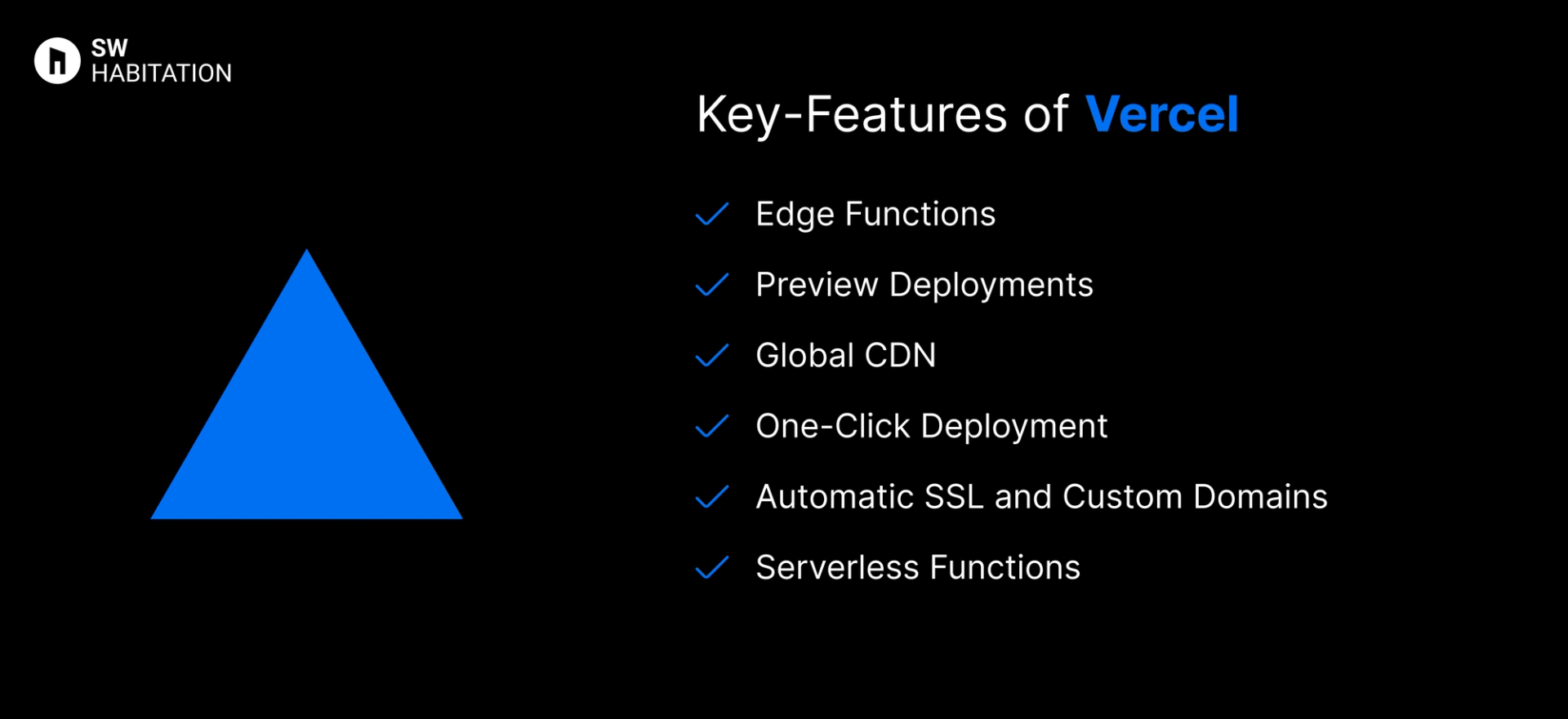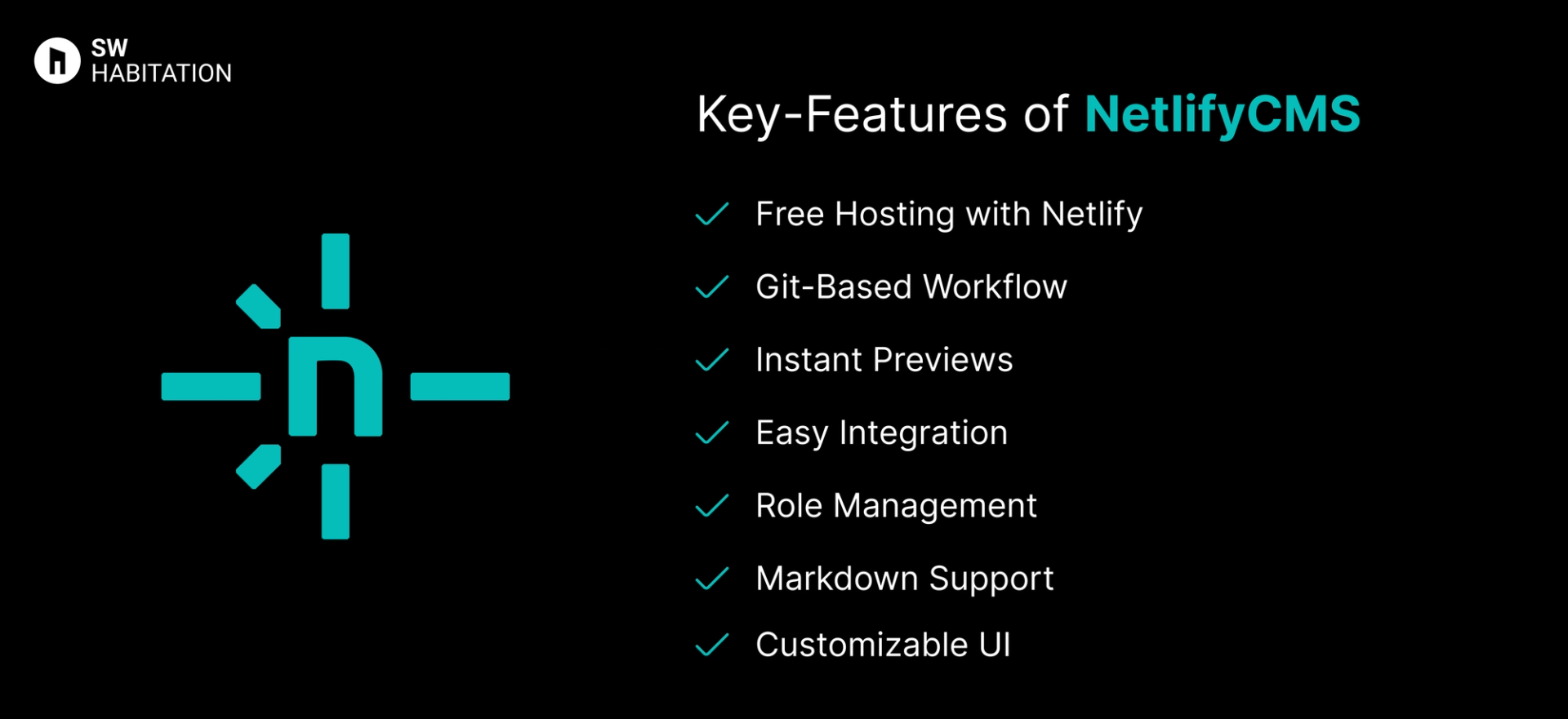Vercel vs. NetlifyCMS

Vercel

NetlifyCMS
You know when you’ve finished building your website and just want to get it online without dealing with all the techy stuff? That’s where deployment platforms help. They make it super easy to put your site live, just connect your code, click a button, and it’s up and running. No need to worry about servers or complicated setups.
They also take care of the important things like speed, security, and updates in the background. So while they handle the heavy stuff, you can focus on making your website look good and work great. It's simple, right?
What is Vercel?
Vercel is a cloud platform for deploying and hosting frontend applications. It excels at making continuous deployment and global delivery feel seamless. Vercel is the company behind Next.js, so if you’re building a Next.js app, this platform is pretty much a match made in heaven. But don’t worry it also supports other frameworks like React, Vue, and Svelte.
Key Features of Vercel


- Edge Functions: Run code at the edge for lightning-fast responses.
- Preview Deployments: Get a unique preview URL for every pull request, making collaboration a breeze.
- Global CDN: Automatically deploys content across a global content delivery network for fast performance.
- One-Click Deployment: Push to GitHub, GitLab, or Bitbucket and deploy instantly.
- Automatic SSL and Custom Domains: Set up your custom domain with HTTPS in seconds.
- Serverless Functions: Add backend logic without managing infrastructure.
Advantages of Vercel
- Great for Collaboration: Preview links for every branch or pull request.
- Effortless Deployment: Connect your repo, and Vercel takes care of the rest.
- Serverless Functions: Easily add backend functionality with zero infrastructure headaches.
- Free Tier: Generous free plan for personal projects.
- Next.js Native: Built by the same team behind Next.js, ensuring top-notch support.
- Blazing Fast: Deploys across a global CDN automatically.
Disadvantages of Vercel
- Learning Curve for Advanced Features: Basic deployment is simple, but advanced features like edge functions require deeper knowledge.
- Vendor Lock-in: Tightly integrated with Next.js, making migration trickier if you switch stacks.
- Limited Backend Support: Focuses on frontend — complex backends need other services.
- Pricing Can Add Up: The free plan is great, but costs can grow quickly with more traffic and features.
What is NetlifyCMS ?
NetlifyCMS is an open-source headless CMS built to work with static site generators like Gatsby, Hugo, and Next.js. It gives you a simple web-based UI to manage your content while storing everything directly in your Git repository. This means every change you make is version-controlled, just like your code.
Key Features of NetlifyCMS


- Free Hosting with Netlify: Deploy instantly with Netlify for free.
- Git-Based Workflow: All content changes are stored as commits in your Git repository.
- Instant Previews: See how your content will look before publishing.
- Easy Integration: Works seamlessly with static site generators like Gatsby, Hugo, and Jekyll.
- Role Management: Assign roles to control who can edit what.
- Markdown Support: Write content in Markdown and preview changes in real time.
- Customizable UI: Tailor the admin interface to fit your content structure.
Advantages of Netlify CMS
- Simple Setup: Easy to integrate with Git and static site generators.
- Free to Use: Open-source and works perfectly with Netlify’s free tier.
- Version Control: Content changes are tracked in Git, ensuring full transparency.
- Fast Deployment: Deploy instantly with Netlify.
- Markdown Support: Write clean, lightweight content with Markdown.
Disadvantages of Netlify CMS
- Not Ideal for Large Projects: Better suited for smaller projects.
- Git Dependency: Requires familiarity with Git workflows.
- Limited Integrations: Fewer built-in integrations compared to larger CMSs.
- No Database: Content is stored as files in Git, not in a traditional database.
Comparison Between Vercel vs NetlifyCMS
Use Cases of Vercel
- Enterprise-Scale Projects: Handles high-traffic apps without breaking a sweat.
- Prototyping and Demos: Instant preview URLs make collaboration smooth.
- Jamstack Sites: Ideal for static sites and serverless functions.
- Next.js Applications: Native support makes deploying Next.js apps a dream.
Use Cases of NetlifyCMS
- Personal Blogs: Simple and fast content management for personal sites.
- Portfolios: Showcase your work with minimal setup.
- Small Business Websites: Perfect for static websites that don’t require complex features.
- Developers Who Love Git: Version control your content the same way you do with code.
Other Resources
Conclusion
Deployment platforms are a total game changer if you’re looking to launch your website quickly, reliably, and without any trouble. Whether it’s a personal portfolio, a startup site, or a growing business platform, they handle the technical heavy lifting like hosting, security, and scalability so you can stay focused on building great experiences for your users.
You’re not boxed into a single approach. Most platforms integrate smoothly with the tools and frameworks you already love, letting you deploy directly from your Git repository, preview updates, and roll back with ease. With lightning-fast performance and dependable uptime, deployment platforms simplify the path from code to production. Pick the one that aligns with your workflow, and you’re all set to launch with confidence 🚀
Frequently asked questions
Is Vercel free to use?
Yes, there’s a free tier with generous limits, perfect for hobby projects, portfolios, and early-stage startups.
How easy is deployment with Vercel?
So easy connect your GitHub/GitLab/Bitbucket repo, and Vercel handles builds, previews, rollbacks, and deployments instantly.
Does Vercel include serverless functions?
Yes, You can run API routes/serverless functions as part of your deployment no need to manage a separate backend.
What frameworks does Vercel support?
Vercel is optimized for Next.js, but it also supports React, Vue, SvelteKit, Nuxt, Astro, and static site generators like Hugo and Eleventy.
What is Netlify CMS?
Netlify CMS is an open-source content management system. It is designed for static site generators. It provides a user-friendly interface for editing content stored in Git repositories.
Is hosting on Netlify required?
Nup, While it integrates seamlessly with Netlify, you can use it with any Git-based static site hosted anywhere.
What static site generators are supported?
Netlify CMS supports popular generators like Hugo, Jekyll, Gatsby, Eleventy (11ty), and others.
